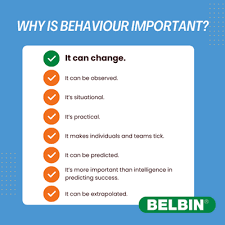The Impact of Behavior on Personal and Professional Success
Behavior plays a crucial role in shaping our lives, influencing our relationships, and determining our success in both personal and professional realms. Our actions, reactions, habits, and attitudes all contribute to the way we navigate the world around us.
In personal interactions, behavior can either foster strong connections or create barriers between individuals. Positive behaviors such as empathy, active listening, and respect can build trust and understanding in relationships. On the other hand, negative behaviors like aggression, dishonesty, or lack of accountability can lead to conflicts and misunderstandings.
Similarly, in the professional world, behavior is a key factor in determining one’s success. Effective communication skills, teamwork abilities, adaptability, and leadership qualities are all examples of behaviors that contribute to a thriving career. Displaying professionalism, integrity, and a positive attitude can help individuals stand out in their workplace and advance in their careers.
It’s important to recognize that behavior is not fixed but can be modified through self-awareness, reflection, and intentional effort. By identifying areas for improvement and committing to personal growth, individuals can develop positive behaviors that align with their goals and values.
Furthermore, understanding the impact of behavior on personal well-being is essential for maintaining mental health and emotional balance. Cultivating healthy habits such as self-care practices, stress management techniques, and boundary-setting behaviors can contribute to overall happiness and fulfillment.
In conclusion, behavior plays a significant role in shaping our experiences and outcomes in life. By being mindful of our actions and choices, we can cultivate positive behaviors that lead to personal growth, strong relationships, career advancement, and overall well-being.
Understanding Behavior: Key Questions and Insights
- What is behavior and why is it important?
- How does behavior impact personal relationships?
- What are some common types of negative behaviors?
- How can behavior be modified or changed?
- What role does behavior play in professional success?
- Are there underlying factors that influence behavior?
What is behavior and why is it important?
Behavior refers to the way individuals act and conduct themselves in various situations. It encompasses actions, reactions, habits, and attitudes that influence how we interact with others and navigate our daily lives. Understanding behavior is crucial because it shapes our relationships, impacts our personal and professional success, and plays a significant role in our overall well-being. By being aware of our behavior patterns, we can make conscious choices to cultivate positive behaviors that align with our values and goals. Recognizing the importance of behavior empowers us to improve communication skills, build strong connections with others, enhance our emotional intelligence, and lead a more fulfilling life.
How does behavior impact personal relationships?
Behavior plays a pivotal role in shaping the dynamics of personal relationships. The way we interact with others, communicate our thoughts and feelings, and respond to various situations all influence the quality of our connections with individuals. Positive behaviors such as empathy, active listening, and respect foster trust, understanding, and intimacy in relationships. Conversely, negative behaviors like criticism, defensiveness, or lack of accountability can erode trust, create conflicts, and strain relationships. By being mindful of our behavior and actively working towards displaying kindness, patience, and openness in our interactions, we can nurture healthy and fulfilling personal relationships based on mutual respect and genuine connection.
What are some common types of negative behaviors?
There are several common types of negative behaviors that can impact individuals in various aspects of their lives. Examples include aggression, passive-aggressiveness, manipulation, dishonesty, gossiping, procrastination, blaming others, and lack of accountability. These behaviors can lead to strained relationships, conflicts in the workplace, decreased productivity, and overall dissatisfaction. Recognizing and addressing these negative behaviors through self-awareness and proactive efforts to change can help individuals improve their interactions with others and enhance their personal and professional growth.
How can behavior be modified or changed?
Behavior can be modified or changed through a combination of self-awareness, intentionality, and consistent effort. One approach is to identify the specific behavior that one wishes to change and understand the underlying triggers or motivations behind it. By recognizing patterns and triggers, individuals can develop strategies to interrupt negative behavior and replace it with more positive alternatives. Setting clear goals, creating action plans, seeking support from others, and practicing new behaviors consistently can all contribute to successful behavior modification. Additionally, engaging in activities such as therapy, coaching, or mindfulness practices can provide valuable tools for self-reflection and growth in the journey towards behavioral change.
What role does behavior play in professional success?
Behavior plays a pivotal role in determining an individual’s professional success. The way a person conducts themselves in the workplace, interacts with colleagues, handles challenges, communicates ideas, and approaches tasks all contribute to their effectiveness and impact within an organization. Positive behaviors such as teamwork, leadership skills, adaptability, professionalism, and a strong work ethic are highly valued traits that can lead to career advancement and recognition. On the other hand, negative behaviors like conflict avoidance, lack of accountability, poor communication skills, or resistance to change can hinder one’s professional growth and limit opportunities for success. Understanding the importance of behavior in the workplace is key to fostering a positive work environment, building strong relationships with coworkers and supervisors, and achieving long-term career goals.
Are there underlying factors that influence behavior?
Certainly, behavior is often influenced by a variety of underlying factors that can shape how individuals act and react in different situations. These factors can include personal experiences, upbringing, cultural background, genetics, social environment, and mental health conditions. For example, someone’s past experiences and traumas may impact their behavior and responses to certain triggers. Similarly, genetic predispositions can play a role in determining personality traits and behavioral tendencies. Additionally, societal norms, peer influences, and environmental stressors can all contribute to how individuals behave in various contexts. Understanding these underlying factors is crucial in gaining insight into why people act the way they do and can help guide efforts to promote positive behavior change and personal growth.




